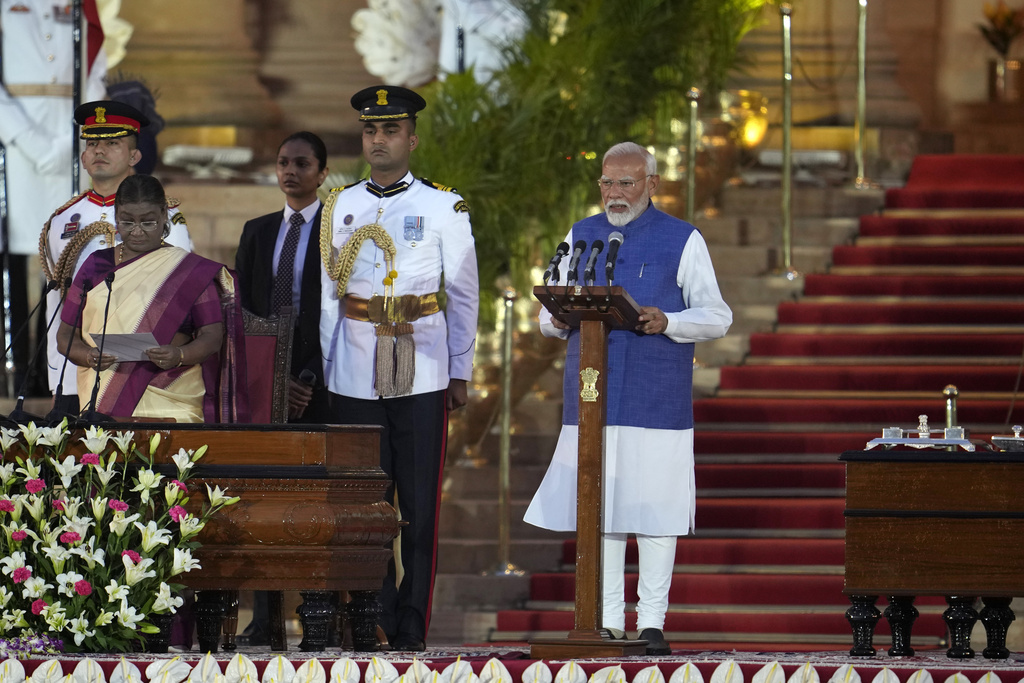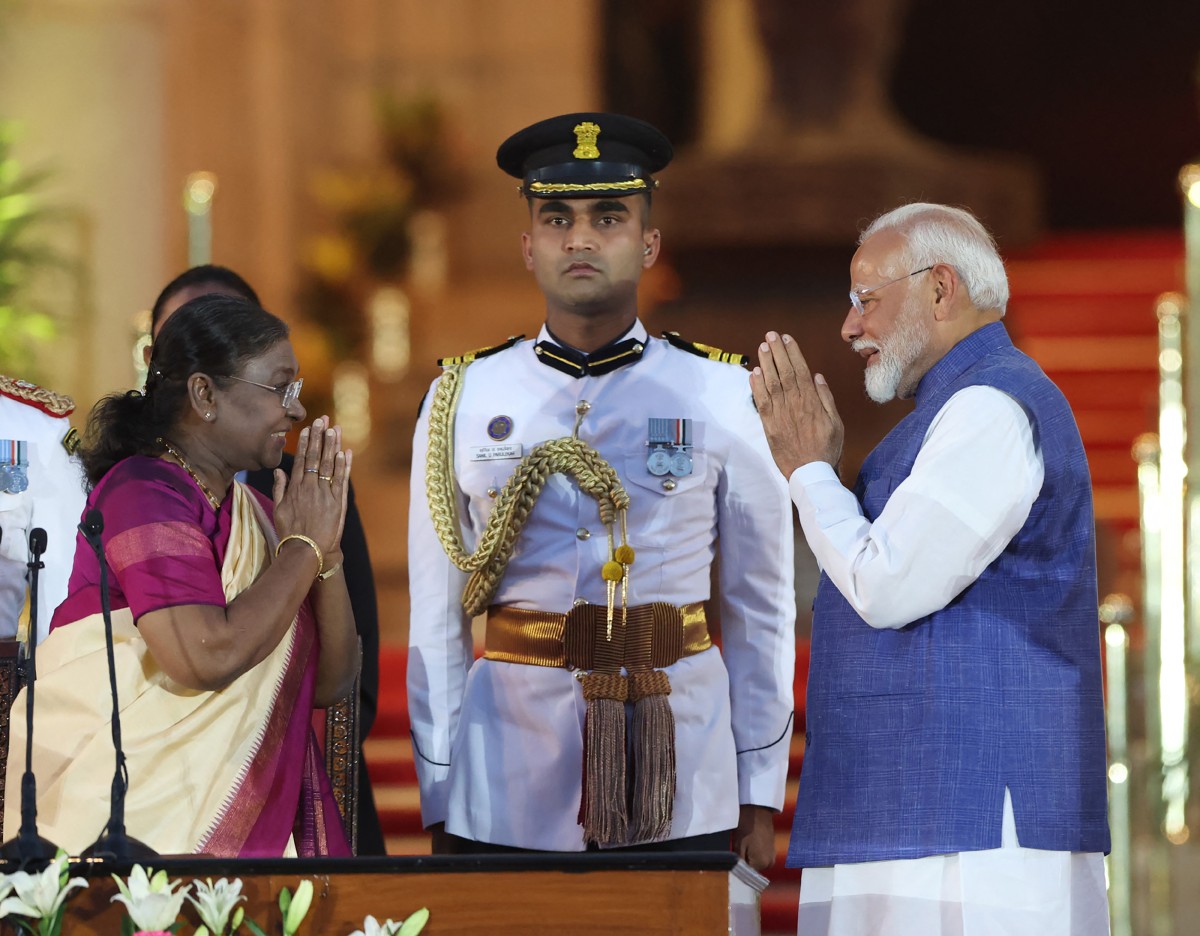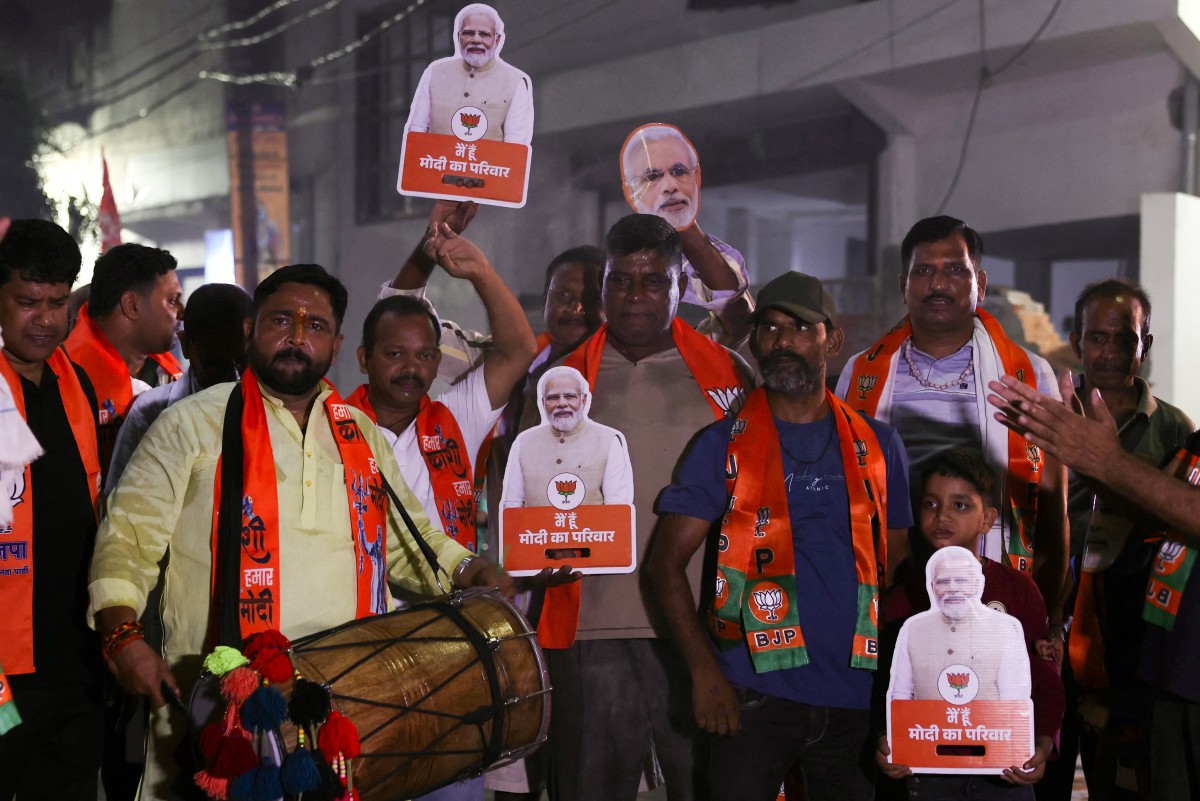
Narendra Modi, leader of Bharatiya Janata Party or BJP, officially launched his historic third consecutive term as Indian prime minister upon taking oath Sunday evening while the country thanked China for congratulating Modi on his election victory.
Indian President Droupadi Murmu administered the oath of office at Rashtrapati Bhavan, official residence of Indian president, in the national capital, New Delhi. Over 70 federal and state ministers have also taken oath.
Modi’s third five-year tenure makes him the only leader after former prime minister Jawaharlal Nehru served a third consecutive term after completing the full tenure of each previous term.
Maldives President Mohamed Muizzu, Sri Lankan President Ranil Wickremesinghe, Bangladesh Prime Minister Sheikh Hasina, Nepal Prime Minister Pushpa Kamal Dahal 'Prachanda', Mauritius Prime Minister Pravind Kumar Jugnauth, Bhutanese Prime Minister Tshering Tobgay, and Vice-President of Seychelles Ahmed Afif were among thousands of guests present at this grand ceremony.
Altogether 35 cabinet ministers, 36 junior ministers, and 5 Ministers of State (independent charge) took oath on Sunday. Rewarding the BJP’s coalition partners, Modi has inducted as many as 11 Members of Parliament from the National Democratic Alliance or NDA
After Modi, Rajnath Singh, Amit Shah, Nitin Gadkari, S Jaishankar, Nirmala Sitharaman and Piyush Goyal also have taken the oath, largely expected to continue to be federal ministers with their respective previous portfolios.
Besides, BJP will try to keep some other key ministries like railways, road transport, law, information technology and education in their fold, a senior BJP leader familiar with the matter said.
Altogether 35 cabinet ministers, 36 junior ministers, and 5 Ministers of State (independent charge) took oath on Sunday. Rewarding the BJP’s coalition partners, Modi has inducted as many as 11 Members of Parliament from the National Democratic Alliance or NDA.
It has also accommodated leaders of alliance partners, like the Telugu Desam Party or TDP and Janata Dal (United), among others coalition partners, to form the government.
India will pursue efforts with China toward normalization of ties between the two nations based on mutual respect, mutual interest and mutual sensitivity, India’s Federal Ministry of External Affairs spokesperson Randhir Jaiswal said on Saturday night in a social media post on X, in response to China’s wishes to PM Modi on June 5.
“Thank you @MFA_China for congratulating PM @narendramodi on his election victory. Will continue to pursue efforts towards normalisation of India-China ties based on mutual respect, mutual interest and mutual sensitivity,” Jaiswal posted on X.
ALSO READ: India's PM-designate Modi stakes claim to form next govt

China’s Foreign Ministry spokesperson congratulated BJP and NDA for the election victory earlier.
“A healthy and stable China-India relationship is in the common interest of both sides and is conducive to peace and development in the region and the world. China is willing to work together with India in the fundamental interests of the two countries and peoples….. ,” Mao Ning said in a press conference in Beijing on June 5.
A multi-phase election that ended on June 1, Modi was forced to rely on smaller regional parties and to form an alliance to a diverse set of coalition partners to claim a majority in parliament and to stay in power as his party, BJP, has failed to secure a majority in Indian parliament
“Congratulations to Prime Minister @narendramodi, BJP and the National Democratic Alliance on the election victory. We look forward to a healthy & stable China-India relationship,” China’s foreign ministry spokesperson Mao Ning posted on X on June 5.
A multi-phase election that ended on June 1, Modi was forced to rely on smaller regional parties and to form an alliance to a diverse set of coalition partners to claim a majority in parliament and to stay in power as his party, BJP, has failed to secure a majority in Indian parliament.
Modi’s third term holds significance as it is the first that he is depending on a fragile coalition with allies, some of them are known to shift their allegiance frequently.
The BJP won only 240 seats, less than the 272 seats needed for any political party to form a government. The NDA coalition, led by BJP got 293 seats, some 61 seats ahead of the opposition INDIA alliance led by India’s main opposition Indian national Congress party. BJP won 303 seats in 2019.
“Honored to serve Bharat,” Modi posted on X, minutes before he was sworn in.
Now an important question is whether Modi can actually turn into a consensus builder, which is something he has not been throughout his more than 24 years in public office, analysts said.

He has always led governments with a majority. Modi has been PM with absolute majority over the past ten years. Earlier, he governed Gujarat, India’s western state, with an absolute majority as well.
“Modi as we know is not used to consensus building, he may face challenges in keeping together his allies,” said Tanvir Aeijaz, Prof Ramjas College, University of Delhi. His projection of Hindutva sentiment will take a backseat this time, which means he may frustrate his core supporters.
One of the biggest challenges Modi will face is in the constant demand of accountability from a visibly strong opposition, Prof Aeijaz emphasized.
Modi as we know is not used to consensus building, he may face challenges in keeping together his allies.
Tanvir Aeijaz, Prof Ramjas College, University of Delhi
In 2014 when Modi became the PM for the first time, he ended coalition governance that continued for many decades in Indian politics when no party had been able to win 272 seats in Parliament required to form a government.
Two regional prominent figures, N Chandrababu Naidu of the TDP and Nitish Kumar’s Janata Dal (United) emerged as kingmakers after they were invited to form the government.
READ MORE: Modi set for 3rd term amid setback
These two leaders have already put forth their demands like scrapping a few contentious laws passed by the government earlier and demanding more funds for their respective states as a part of their conditions to support the government, another senior BJP leader who refused to be identified said.
The decision to form the new cabinet came following an 11-hour long discussion on Saturday at the prime minister's residence with other senior party leaders.
“To run the government, a majority is necessary. But to run the nation, a consensus is necessary,” Modi said on Friday to his coalition party, a day ahead of his swearing in. “The people want us to deliver better than before,” said Modi.
After 72 ministers were sworn in by the president, the national anthem was played to close the event officially.
A third term in office is the time when leaders become far more conscious about their legacies and how they will be remembered, said Swaran Singh, a professor of international relations at the Jawaharlal Nehru University in New Delhi.
The writer is a freelance journalist for China Daily.


